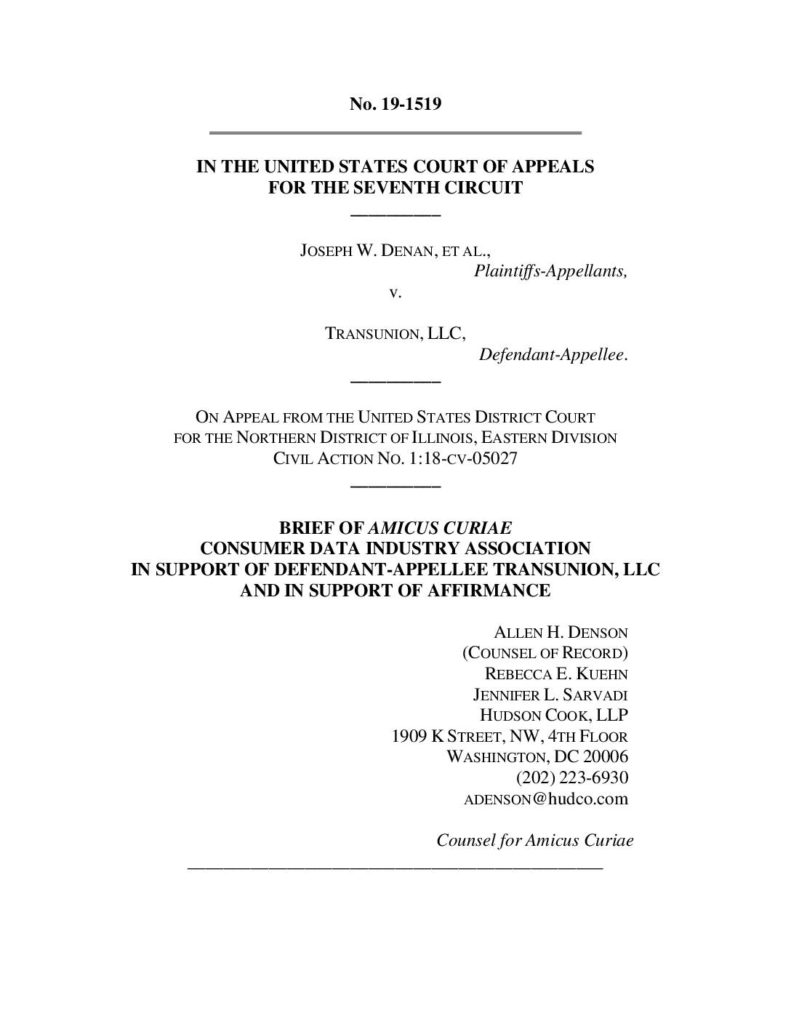
| Laws | |
| Topics and Issues | Class action (9) FCRA Litigation (4) |
In August 2019, CDIA filed an amicus brief before the Seventh Circuit in support of TransUnion in Denan v. TransUnion. As noted in the 3-0 decision in 2020 in support of TransUnion, the Court was asked “to decide whether §§ 1681e(b) and 1681i(a) of the FCRA compel consumer reporting agencies to determine the legal validity of disputed debts. The district court dismissed plaintiffs’ lawsuit, holding these provisions impose no such duty. Finding no error in the district court’s decision, we affirm.”
The 7th Circuit affirmed the district courts’ decisions, establishing that the key inquiry is “whether the alleged inaccuracy turns on applying law to facts or simply examining the facts alone.” because “consumer reporting agencies are competent to make factual determinations, but they do not make legal conclusion like courts and other tribunals do.” The appellate court further noted that “[b]ecause the plaintiffs in these cases asked the consumer reporting agencies to make primarily legal determinations, they have not stated claims under the [FCRA].”
CDIA noted to the Court in its brief that the Plaintiffs-Appellants attempt to create obligations on CRAs that do not exist today. The FCRA was carefully crafted – and has been amended over time – to allocate the various responsibilities with regard to consumer report information among those best suited to uphold them. In particular, CRAs are charged with maintaining reasonable procedures to assure maximum possible accuracy” of the information they include in a particular consumer report. To that end, CRAs have developed procedures regarding the intake, maintenance, and publication of the data they hold on consumers. Furnishers, which are persons who provide information to the CRAs about the consumers and their accounts, are charged with reporting such information with “accuracy” and “integrity” in that the information provided to CRAs must accurately reflect the liability of each consumer with respect to the account reported. Finally, consumers have the right to dispute the accuracy or completeness of consumer report information, and the FCRA requires the CRA to forward the dispute to the furnisher to evaluate its merits. No provision of the FCRA places the CRA into the role of adjudicator of the legality or enforceability of any account, whether part of a reinvestigation of a dispute or otherwise.
Courts that have examined whether a CRA must determine the legal validity of an account in order for the information to be deemed sufficiently accurate to report have answered in the negative. Courts regularly prohibit such “collateral attacks” against the underlying loan’s validity, and decline to hold CRAs liable under the FCRA and the cases relied upon by Plaintiffs-Appellants do not lead to a different result.
There are good reasons why a CRA is not required to adjudicate the legal validity of a loan or other account. In addition to the fact that it is the furnishers who are in the best position to know the facts and circumstances surrounding the making of the loan and not the CRAs, the inquiry required to make such a determination is a complex and inherently legal one. It involves complex questions of law, which must be applied to specific facts related to the making of the loan, and the legal standing and capacities of the parties thereto, together with other equitable factors that might weigh in favor of one party or the other. Add to the mix unsettled questions of law, such as the status of “tribal lenders” and state law requirements regarding licensure, and this becomes extremely complicated and time-consuming, quite unlikely to be resolved within the FCRA’s required 30-day window for dispute handling. This undertaking is inherently the province and duty of the courts, and not CRAs. Finally, although it may sound easy to simply “questionable” data from the CRAs’ databases, this could amount to throwing the baby out with the bathwater. As an initial matter, regulators have expressed concern with simply deleting items in response to a dispute. Moreover, removing data without awaiting a judicial adjudication of the parties’ interests would be premature, depriving creditors of knowledge of a consumer’s current obligations, and potentially depriving consumers from the reporting of positive payment histories many have worked hard to build. The FCRA does not require CRAs to adjudicate claims such as the one at issue here, and this Court should decline impose such a requirement. Thus, the ruling of the District Court below should be affirmed.